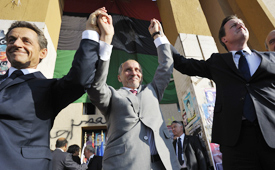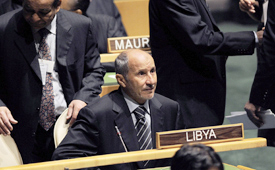|
 |
 |
|
EU SUPPORT: French President Nicolas Sarkozy, NTC head Mustafa Abdul Jalil and British Prime Minister David Cameron (left to right) join hands in Benghazi on September 15 (XINHUA/AFP) |
NEW KID ON THE BLOCK: Mustafa Abdul Jalil, head of Libya's National Transitional Council (NTC), takes his country's seat during the general debate of the 66th session of the UN General Assembly on September 21 (CFP) |
China's attitude on Libya is consistent, Li said. It must take some time to watch before recognizing a new government, especially one that is established through non-peaceful methods. That's why China waited until the NTC became completely stable to take responsibility for representing Libya in the world.
Ding Chengyao, another expert on international law with the East China University of Political Science and Law in Shanghai, pointed out that China has been playing a responsible role ever since the beginning of the NATO-led military intervention in Libya in March.
From March to July, China maintained contact with both the Gaddafi government and the NTC, intending to push forward reconciliation. When the NTC started to exercise administration over Libya in August, China expressed its attitude of "respecting the Libyan people's choice." By September 12, about 70 countries had recognized the legitimacy of the NTC.
The International Monetary Fund recognized the council on September 1, a move that greatly influenced China's final decision, Ding said.
The UN General Assembly voted to give Libya's seat in the UN to the NTC on September 16. On the same day, the UN Security Council adopted a resolution to lift sanctions against Libya's assets. It also set up a UN mission to help restore public security and initiate economic recovery in the North African country.
Considering the economic interdependence between China and Libya, China and the NTC will cooperate during Libya's reconstruction, said Mei Xinyu, a researcher with the Chinese Academy of International Trade and Economic Cooperation.
After China recognized the NTC, the NTC said the Libyan people and the NTC are happy at China's recognition and had long been looking forward to it. Attaching great importance to China's status and role, the NTC will stick to the one-China policy, welcome China's participation in Libya's reconstruction and jointly advance bilateral relations with China.
China said it hopes Libya can restore stability, embark on the path of political and economic reconstruction and maintain national unity and solidarity. China would like to work with the NTC to push forward Sino-Libyan cooperative relations of friendship and mutual benefit on the basis of mutual respect, equality and reciprocity.
"We adopt a positive attitude toward the post-war reconstruction of Libya," said China's Foreign Ministry. Moreover, visiting French Foreign Minister Alain Juppé declared in Beijing that France would like to cooperate with China and jointly participate in Libya's reconstruction on September 13.
Mei pointed out that economically, Libya relies greatly on China. Official Chinese statistics show the two sides' trade volume was $6.58 billion in 2010, with China's exports to and imports from Libya amounting to $2.06 billion and $4.51 billion respectively. Libya's oil exports to China accounted for 11 percent of its total oil output.
The contract volume of Chinese enterprises' projects in Libya was about $5.84 billion in 2009, about 4.6 percent of China's total contract volume in foreign countries. Also, by the end of 2009, China had invested about $42.69 million in Libya.
Mei said the NTC now is in urgent need of reconstruction. Chinese enterprises have outstanding advantages in providing inexpensive commodities and more efficient building projects. There is therefore no reason for the NTC to discard Chinese enterprises and turn to more expensive goods and services.
The NTC has declared it will honor all treaties and agreements signed between the two countries, including oil agreements that Libya previously signed with Chinese enterprises.
Given devastating effects of the war, Libya might have much less income from exporting oil than during Gaddafi's rule. But the NTC will benefit from its cooperation with competitive Chinese companies, Mei said. | 